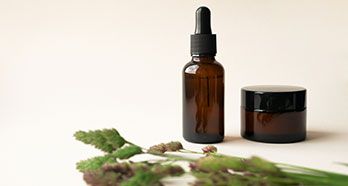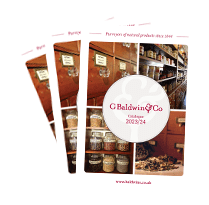How to Manage Menopause: Expert Medical Herbalist Advice
Written by Amanda Rew, Medical Herbalist, MCPP
As women approach midlife, many experience symptoms associated with perimenopause and menopause. These symptoms are caused by declining estrogen levels and fluctuating reproductive hormones. Understanding these changes and seeking appropriate support can help navigate this natural transition more smoothly. In this blog post, we'll explore the symptoms of menopause and discuss how herbal remedies and lifestyle choices can provide relief.
Common Symptoms of Menopause
The symptoms experienced during perimenopause and menopause can vary from woman to woman. Some of the most common symptoms include:
Hot flushes, night sweats, and disturbed sleep:
These uncomfortable experiences can occur during perimenopause and continue into menopause. They vary in intensity, duration, and frequency.
Mood changes:
Many women may experience irritability and low mood as a result of hormonal fluctuations during menopause.
Genitourinary problems:
Vaginal dryness, reduced lubrication, and decreased elasticity of vaginal tissues can make sex painful. Additionally, an increase in urinary tract problems may be observed.
Bone density loss:
Declining estrogen levels can lead to a decrease in bone density, potentially resulting in conditions like osteopenia or osteoporosis.
Changes in blood cholesterol levels:
Menopause can cause an increase in LDL ("bad") cholesterol and lower levels of HDL ("good") cholesterol, thereby increasing the risk of heart disease.
Psychological aspects:
Menopause can have an impact on a woman's overall well-being, causing emotional and psychological changes due to the hormonal shifts.
It's important to note that if you experience vaginal bleeding at any stage following menopause, it is considered a red flag, and medical advice should be sought immediately.
Herbal Remedies for Menopause Symptoms
As a herbalist, my approach focuses on treating the whole person rather than individual symptoms. I consider lifestyle factors, dietary habits, and recommend herbal treatments and supplements if appropriate. Here are some herbs that can be helpful in managing menopause symptoms:
Sage:
Drinking cold sage infusion or using frozen sage ice cubes can help reduce hot flushes and night sweats. Sage combines well with black cohosh and lemon balm and is associated with improved mental clarity.
Black cohosh:
Traditionally used by Native Americans to ease arthritis and rheumatism, black cohosh is effective in treating hot flushes, night sweats, and disturbed sleep. It can also improve mood and reduce irritability.
St. John's Wort:
This herb can reduce anxiety, uplift mood, and improve sleep. However, it should not be taken alongside certain conventional medications, so it's important to consult with a healthcare professional.
Scullcap:
Scullcap nourishes the nervous system, reducing anxiety and uplifting mood. It can aid in achieving restorative sleep.
Hops:
Phytoestrogenic and sedative, hops can help relieve night sweats and improve sleep quality. However, it is extremely bitter-tasting and should be taken in low doses.
Red clover:
Another phytoestrogenic herb, red clover can improve hot flushes, night sweats, and poor sleep.
Lifestyle Choices for Menopause Support
In addition to herbal remedies, certain lifestyle choices can contribute to a smoother menopausal transition. Consider incorporating the following into your routine:
Balanced Diet:
A high-fiber diet consisting of whole foods such as grains, pulses, fresh fruits, nuts, and seeds can help regulate blood sugar and cholesterol levels. It also ensures regular bowel movements, enhances gut flora, and helps maintain a healthy body weight.
Exercise:
Engage in regular physical activity, including weight-bearing exercises that strengthen bones and your core. Activities like gardening, walking, cleaning, and yoga or pilates can have a positive impact on bone health and mood. Remember, going to the gym is not compulsory!
Omega-3 Fatty Acids:
Include foods rich in omega-3 fatty acids, such as oily fish, in your diet. These essential fatty acids reduce inflammation, lower the risk of developing heart disease, and alleviate hot flushes and vaginal dryness.
Vitamin D3:
Ensure adequate intake of vitamin D3, which helps the body absorb calcium and maintain strong bones. Exposure to sunlight and dietary sources can help optimize vitamin D levels.
Microbiome Support:
The microbiome plays an important role in menopause and symptom management. Incorporate herbs, spices, and a varied wholefood diet whenever possible to support a healthy microbiome.
Recommended Products for Menopausal Support
At Baldwin's, we recommend several products that can provide relief from menopausal symptoms. These include:
Vogel's Menopause book:
This resource can demystify menopause and help you make positive changes during this stage of life.
Vogel's Menopause support:
This product contains soy isoflavones and can help reduce the frequency of hot flushes.
D Atkinson's Cool and Collected tea: This tea blend addresses various menopausal symptoms. Follow the instructions on the packet, and you can enjoy it hot, cold, or as ice cubes for a refreshing option.
Vitamin E oil and capsules:
Topically applied vitamin E oil around and in the vagina can improve skin elasticity and tone, enhancing comfort and pleasure during sex.
Baldwin's Rosewater:
Use a spritzer bottle to apply rosewater, a cooling and mood-lifting agent, liberally throughout the day for a refreshing experience.
Alternatively, you can create your own herbal mix using tinctures or dried herbs. For personalised recommendations, consider booking an online mini consultation with a Baldwin's medical herbalist.
Enjoying Menopause with Baldwins
Menopause is a natural phase of a woman's life, but the associated symptoms can be challenging. Herbal remedies and lifestyle choices can offer support during this transition. However, it's essential to remember that each individual is unique, and a holistic approach is crucial. For a comprehensive evaluation, it is advisable to consult a qualified and insured medical herbalist who can tailor treatments and suggestions to your specific needs. Embrace this transformative stage with knowledge and the right support to make the most out of your menopausal years.
Disclaimer: The information provided in this blog post is for educational purposes only and should not be considered a substitute for professional medical advice. Each individual's circumstances are different, and it's important to consult with a qualified healthcare provider for personalised guidance.







 Looking for Qualified Advice on Herbs & Supplements?
Read our health guides, quick tips and popular posts on a range of health conditions, products & fitness
Looking for Qualified Advice on Herbs & Supplements?
Read our health guides, quick tips and popular posts on a range of health conditions, products & fitness
 At number 64, our Walworth Road Shops are featured in Time out London’s
100 best shops and we couldn’t be more delighted!
At number 64, our Walworth Road Shops are featured in Time out London’s
100 best shops and we couldn’t be more delighted!

 View our Catalogue online.
It is stocked full of our latest oils, beauty products, health foods & gifts.
View our Catalogue online.
It is stocked full of our latest oils, beauty products, health foods & gifts.